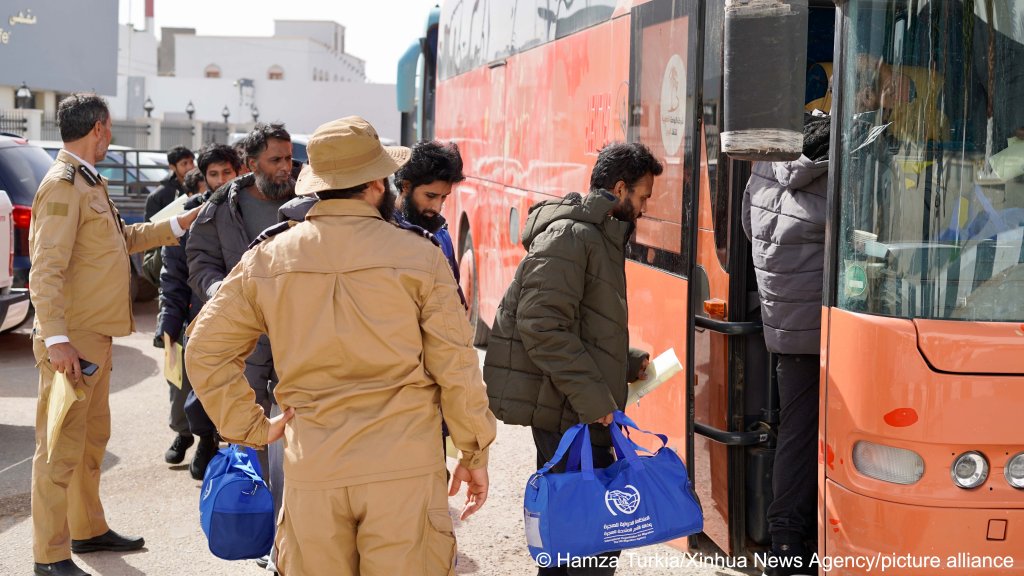The Libyan government has sent at least 160 Bangladeshi migrants back to their home country as part of an IOM voluntary return program. However, there are some discrepancies on how many of the returnees actually were part of the voluntary program, and how many could have been sent back involuntarily.
The Libyan Illegal Migration Control Department announced on March 12, that it had "deported 160 illegal migrants of Bangladeshi nationality to their country through a flight from Tripoli Mitiga International Airport to Dhaka, Bangladesh."
However, Bangladeshi news sources cited that a total of 176 nationals had been returned, and also highlighted that 106 of the returnees had been detained at the Tajoura Detention Center in Tripoli while adding that only 70 of the returnees were participants of the official IOM voluntary return program.
InfoMigrants contacted IOM Libya via X, to clarify this discrepancy. They answered: "On March 12, 2025, IOM Libya organized a voluntary humanitarian return charter flight from Tripoli to Dhaka, Bangladesh. The flight departed from Mitiga airport. The total number of migrants on board were 176. There were 12 migrants with medical conditions, and one unaccompanied minor and separated children (USAC) on board the flight." A medical escort was also on board the flight, IOM Libya added.

According to Bangladesh's embassy in Libya, two more such returns flights are scheduled for March 19 and 26, with over 300 Bangladeshis expected to return on those flights.
Earlier this week, the Illegal Migration Control Department reportedly also sent back a group of Egyptian migrants to their home country over the land border that the two nations share.
Read AlsoThe cruel reality of migrant detention and deportation in Libya
Libya focusing on 'voluntary' returns
Libya's Illegal Migration Control Department spokesperson Khalid al-Abyad also confirmed that the government was focusing on trying to convince more migrants who had entered the country using irregular means to agree on signing up for the voluntary departures.
He did not comment over whether any of the returnees had been forcefully sent back to their country.
Libyan Interior Minister Emad al-Tarabelsi highlighted the importance of voluntary return programs, which are coordinated by the International Organization for Migration (IOM).
In a prior statement, al-Tarabelsi had said that Libyan authorities might have to resort to "forced deportation of illegal migrants" if international voluntary return programs were cut.
Read AlsoScores of bodies uncovered in Libyan mass graves linked to human trafficking
European support of Libyan coast guard
Various European countries meanwhile help support Libya's coast guard and other authorities charged with preventing migrants leaving Libyan shores to reach Europe.
To date this year, Libyan officials have intercepted nearly 5,000 people at sea and returned them to Libya. In all of 2024, there were over 20,000 such interceptions. Some of those intercepted at sea end up leaving on some kind of voluntary return program later.
Meanwhile, the IOM says that between January 1 and March 1 this year, 82 migrants are confirmed to have died en route to Europe across the central Mediterranean route and 58 remain missing.
Read AlsoLibyan coast guard officials hit migrants, Sea Watch says
A lawless gateway to Europe
Since the fall of former autocratic leader Moammar Gaddafi in 2011, Libya has become one of the main transit hubs for migrants seeking to reach Europe. Large swathes of the country remain practically lawless, with rivalling warlords claiming control over different areas of the country.
Many migrants hoping to use Libya as a transit country end up getting stuck in the North African country or fall victim to criminal gangs before they can even attempt to cross the Mediterranean Sea.
There have been numerous reports in the past decade of severe human rights abuses at the hands of these criminal organizations, including slavery, forced prostitution, torture for extortion and summary executions.
Read AlsoLeft to be forgotten: EU accused of being complicit in migrant 'dumping' in North Africa
